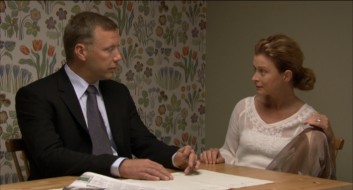Heavenís
Heart (Simon Staho, 2008)
 A stripped down, four character chamber drama that ventures into familiar
territory with a decidedly cool head, Simon Stahoís
Heavenís Heart details a marital
breakup with nuance and insight. Focusing entirely on two middle-aged, married
couples as they confront adulterous impulses, the film begins with an extended
dinner party sequence that firmly sets both the tone and the plot. Very quickly,
the austere, minimalist world of Heavenís
Heart becomes a battleground over the meaning of marriage.
A stripped down, four character chamber drama that ventures into familiar
territory with a decidedly cool head, Simon Stahoís
Heavenís Heart details a marital
breakup with nuance and insight. Focusing entirely on two middle-aged, married
couples as they confront adulterous impulses, the film begins with an extended
dinner party sequence that firmly sets both the tone and the plot. Very quickly,
the austere, minimalist world of Heavenís
Heart becomes a battleground over the meaning of marriage.
Initially the film recalls Scenes From a
Marriage, as it dissects its charactersí slow decline as they move from the
point where they seem made for each other to the point where you marvel that
theyíve managed to stay together for years. Here, though, existential concerns
are so downplayed that comparisons to Bergman arenít especially apt. More
accurately, Heavenís Heart feels like
Liv Ullmanís Faithless. No
particularly weighty themes are present to distract from the topic at hand.
Instead Staho opts to recount the dissolution of the marriage in exacting
detail, focusing on minute psychological shifts and moral betrayals.
 Stahoís fine direction is essential to making
Heavenís Heart work. With his
symmetrical, geometrically astute compositions, he drives home the emotional
confinement that defines all of his characters. The suffocating, tasteful dťcor
recalls Woody Allenís Interiors
without Maureen Stapleton to deflate the pomposity.
Most scenes are extended dialogues between two of the characters. Usually
Staho either situates his two actors equally within the frame or gives them the
same placement in a shot/countershot sequence. The rare occasions on which Staho
moves his camera become quite powerful as a result.
Stahoís fine direction is essential to making
Heavenís Heart work. With his
symmetrical, geometrically astute compositions, he drives home the emotional
confinement that defines all of his characters. The suffocating, tasteful dťcor
recalls Woody Allenís Interiors
without Maureen Stapleton to deflate the pomposity.
Most scenes are extended dialogues between two of the characters. Usually
Staho either situates his two actors equally within the frame or gives them the
same placement in a shot/countershot sequence. The rare occasions on which Staho
moves his camera become quite powerful as a result.
This visual symmetry extends to the plot structure itself. The opening scene is
repeated at the ending. Even the filmís emotional tenor is even bifurcated
straight down the middle, with the first half featuring repression and the
second half the drama that emerges once all cards are on the table. Whatís
refreshing is how Staho refuses to turn any of his fully formulated characters
into a villain. Even Susanna, who comes the closest to plotting any sort of
vindictive act, receives ample opportunity to make her case and show her
humanity. Chamber dramas are one of the most difficult genres to pull off in
cinema, because one slight miscalculation sends the whole thing crashing down,
like a house of cards. Heavenís Heart
overcomes any skepticism that might emerge because this material is familiar or
the style self-conscious. What initially seems too blunt and too neatly
constructed develops considerable texture as this particularly concise film
unspools.
61
Jeremy Heilman
08.06.08